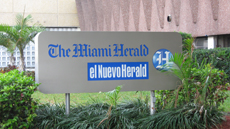Introduction

On September 8, 2006, the Miami Herald ran a Page One story titled “10 Miami journalists take U.S. pay.” The story by Oscar Corral reported that Miami-area journalists had accepted money from Radio/TV Martí, a US government-run broadcast targeted at the communist nation of Cuba. Three of the 11 journalists named in the story worked for El Nuevo Herald , a Spanish-language newspaper also owned by the Miami Herald Media Company. Corral wrote that the three had been fired for violating conflict of interest rules.
The story, and the disciplinary action, unleashed a firestorm of protest from Cuban-Americans and others in greater Miami. Nearly two thousand readers canceled their subscriptions. The accused at Nuevo Herald protested that they had permission from a previous editor to work at Radio Martí. Those accused who did not work for Nuevo Herald wondered why the Miami Herald story had cast as reprehensible a practice which they regarded as professionally unremarkable, and also a moral duty. Charges of racism and anti-Cuban prejudice raced through the Cuban-American community and fetched headlines elsewhere.
Publisher Jesús Díaz, Jr., held ultimate responsibility for both newspapers. He had made the decision to fire the three Nuevo Herald reporters. As criticism mounted, he came in for scathing critique within both the Nuevo Herald and—to the surprise of some—the Miami Herald newsrooms. On September 15, nationally recognized Miami Herald columnist Carl Hiassen submitted for publication a column about the Radio Martí incident in which, Díaz felt, Hiassen made light of the situation. Fearing more backlash, Díaz spiked the column. Hiassen protested, and threatened to resign.
The McClatchy Company had bought the Knight-Ridder newspaper chain, with its crown jewel, the Miami Herald , just three months earlier. Headquartered in Sacramento, California, McClatchy rarely interfered in the running of its properties. But when news of the Hiassen stand-off reached Vice President for News Howard Weaver, he got involved. Hiassen’s column, he agreed, should run—and it appeared in its regularly scheduled slot on September 17.
But matters did not die down. Instead, McClatchy watched with dismay as outrage mounted at El Nuevo Herald , at least one of the dismissed reporters threatened a lawsuit, others of the accused went on the attack, and the Nuevo Herald itself published a story about American journalists who regularly worked for government-funded Voice of America and Radio Free Europe—with no consequences. The implicit question: why had the Miami Herald fired Cuban-American journalists for appearing on Radio Martí? As the situation continued to worsen into early October, Vice President Weaver wondered whether McClatchy should become even more involved and, if so, what it could do to restore calm and mend damaged relations both between its two properties, and between the Miami Herald and the wider Miami community.